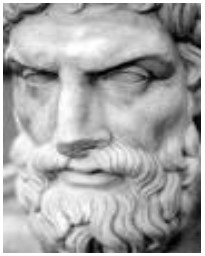

“Do not spoil what you have by desiring what you have not; but remember that what you now have was once among the things you only hoped for. “ --- Epicurus
“不要期望你沒有的,損害你已有的;但是記住,目前你擁有的,曾是你只渴求的。” --- 伊比鳩魯
[名人介紹]
創立哲學伊比鳩魯學派(Epicureanism)的希臘哲學家伊比鳩魯(B.C.341-270),認為人生目的和指導原則是增進快樂和避免痛苦,因而主張幸福生活的起點和終點都該是快樂。人如能克服對成敗的恐懼,便可得到快樂,因此人生至高目標是免於恐懼。
這論述由相關的兩句話組成,第一句告戒你要珍惜已有的,不要好高騖遠,吃在碗裡,看在盤理。伊比鳩魯學派把快樂當成人生唯一的善和道德,認為珍惜已有的比追求虛幻的,更能帶給人心靈的快樂。後一句又恐怕你變成一個沒有理想的現實主義者,所以告誡你,有理想才能將理想實現。平衡這兩個理念,才有快樂人生。
[單字]
- spoil : 搞糟,寵壞,腐壞,贓物
“The rain spoiled our picnic.”
“這場雨搞砸了我們的野餐。”
“They spoiled their child.”
“他們寵壞了孩子。”
“The apples spoiled.”
“蘋果腐爛了。”
“The robbers divided up their spoils.”
“強盜們把贓物分了。”
- desire : 希望,慾望
“He desired us to leave soon.”
“他希望我們儘快離開。”
“She desired to marry a rich man.”
“她很想嫁個富翁。”
“People desire peace.”
“人們渴望和平。”
“I have no desire to discuss the question.”
“我不想討論這個問題。”
“He brought me my heart’s desire.”
“他帶給我我心裡渴望的東西。”
- remember : 記得,記住
“I remember telling you about it once.”
“我記得這事和你談過一次。”
“Do you remember her telephone number?”
“你記得她的電話號碼嗎?”
“Remember to write us when you get there.”
“到了那兒記得給我們寫信。”
“If I remember correctly, your brother went to Canada ten years ago.”
“如果我記得不錯,你弟弟十年前就到加拿大去了。”
[句子分析]
第一句的練習要點是“what you have”(你有的) 和“what you have not”(你沒有的),相對的兩個片語,後一句也可以寫成 “what you don’t have”,但“what you have not”比較簡潔。
模擬這兩個片語造句如下:
“What you have is very important, but what you don’t have is worth you to pursue too.”
“你已有的很重要,但你沒有的也值得追求。”
練習將下列中文句子,應用這兩個片語翻譯成英文;
“通常人都不珍惜已有的,而常追求自己沒有的。”
“spoil” 很難翻譯成貼切的中文,常見的意思是”寵壞了”,例如:
“You will spoil your child if you keep buy things he asked for.”
“如果你一直買孩子要的東西,你會寵壞了他。”
第二句話是第一句語意的延伸,作文並不只求寫出文法正確的句子,更要能表達完整的思維。這兩個句子表達的方式可以學習。注意:第二句以 “but remember”,“但是記住” 作轉折的連接,可以模仿。



 留言列表
留言列表